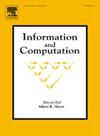Secretive interaction
IF 1
4区 计算机科学
Q3 COMPUTER SCIENCE, THEORY & METHODS
引用次数: 0
Abstract
We study the behaviour of n players engaged in a conversation, each attempting to predict the behaviour of the others. We prove that, under a certain notion of interaction, it is possible to learn all other players, but, generally, not without being learned back. We then focus on the interaction of two players and consider, for different methodological restrictions based on the philosophy of science, whether some form of secretive learning can be achieved.
秘密互动
我们研究了参与对话的 n 个玩家的行为,每个玩家都试图预测其他玩家的行为。我们证明,在一定的互动概念下,学习其他所有参与者是可能的,但一般来说,不可能不被其他参与者学习。然后,我们将重点放在两个棋手的互动上,并根据基于科学哲学的不同方法限制,考虑是否可以实现某种形式的秘密学习。
本文章由计算机程序翻译,如有差异,请以英文原文为准。
求助全文
约1分钟内获得全文
求助全文
来源期刊

Information and Computation
工程技术-计算机:理论方法
CiteScore
2.30
自引率
0.00%
发文量
119
审稿时长
140 days
期刊介绍:
Information and Computation welcomes original papers in all areas of theoretical computer science and computational applications of information theory. Survey articles of exceptional quality will also be considered. Particularly welcome are papers contributing new results in active theoretical areas such as
-Biological computation and computational biology-
Computational complexity-
Computer theorem-proving-
Concurrency and distributed process theory-
Cryptographic theory-
Data base theory-
Decision problems in logic-
Design and analysis of algorithms-
Discrete optimization and mathematical programming-
Inductive inference and learning theory-
Logic & constraint programming-
Program verification & model checking-
Probabilistic & Quantum computation-
Semantics of programming languages-
Symbolic computation, lambda calculus, and rewriting systems-
Types and typechecking
 求助内容:
求助内容: 应助结果提醒方式:
应助结果提醒方式:


